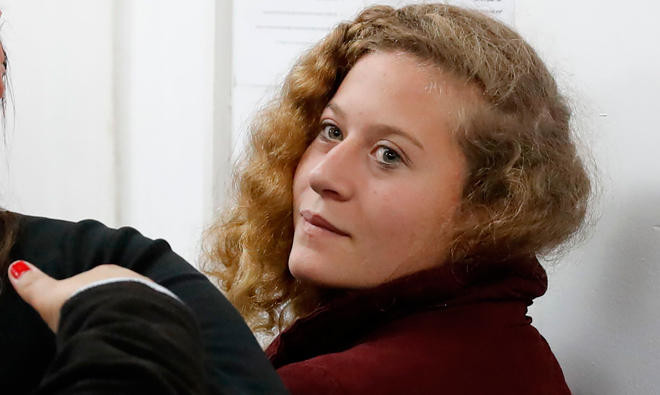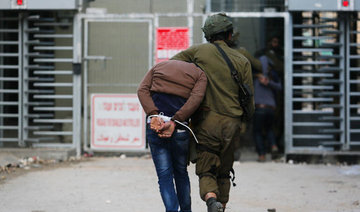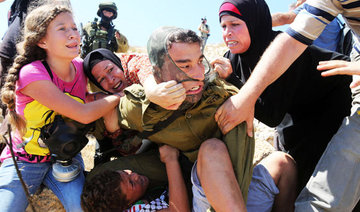RAMALLAH: Israeli forces arrested a third Palestinian woman on Wednesday in connection with a viral video showing Israeli soldiers being slapped in the occupied West Bank.
Soldiers arrested Nour Naji Tamimi, 21, from the village of Nabi Saleh north of Ramallah in the West Bank, residents said.
Cousin Ahed Tamimi, 17, a well-known campaigner against Israel’s occupation, was arrested on Tuesday along with her mother.
The video shot last Friday, apparently with a mobile telephone, showed two Palestinian girls approaching two Israeli soldiers, before shoving, kicking and slapping them while filming on mobile phones.
The heavily armed soldiers do not respond in the face of what appears to be an attempt to provoke rather than seriously harm them. They then move backward.
The army confirmed it had made a third arrest.
The cousin is expected to be brought before an Israeli military court on Wednesday.
The video appears to have been filmed on the steps of the Tamimi house, during a day of protests against US President Donald Trump’s controversial recognition of Jerusalem as Israel’s capital.
It has been widely picked up by Israeli media, which often accuse Palestinian protesters of seeking to provoke the army into responses which are then filmed.
Israeli politicians hailed the restraint of the soldiers as evidence of the military’s values.
Palestinians on social media criticized Ahed’s arrest in the middle of the night, arguing it is the people’s right to resist military occupation.
A member of the Tamimi family was shot in the head with a rubber bullet during protests on Friday, the family said.
Women who slapped Israeli soldiers arrested
Women who slapped Israeli soldiers arrested

Palestinian detainee Najem dies in Israeli custody after medical negligence

- Mohyee al-Din Fahmi Najem is the 66th Palestinian prisoner since October 2023 to die in an Israeli prison
- During a prison visit in March, Najem was unable to walk without assistance
LONDON: A Palestinian prisoner died on Sunday at Israel’s Soroka Medical Center after spending more than a year and a half in indefinite administrative detention, the Wafa news agency reported.
Mohyee al-Din Fahmi Najem, 60, was detained on Aug. 8, 2023 under administrative detention, a practice that allows Israeli authorities to hold individuals in prison without trial for six months, subject to indefinite renewals.
The Palestinian Commission of Detainees and Ex-Detainees Affairs, and the Palestinian Prisoners’ Society, said Najem died after suffering from medical neglect in Israeli prisons.
The Palestinian Authority’s affiliated groups said that Najem “suffered from chronic illnesses and was denied proper medical care during his incarceration.”
Najem was a father of six from Jenin town, in the northern occupied West Bank, who has spent 19 years in Israeli prisons because of his political activism. During a March prison visit, he was unable to walk without assistance, according to the commission and the Prisoners’ Society. They accused Israeli authorities of “compound crimes” during Najem’s prolonged detention, and medical negligence.
He was previously held in the notorious Negev Prison, known for its outbreaks of scabies last November and poor hygiene and medical infrastructure.
Najem is the 66th Palestinian prisoner to die in an Israeli prison since the outbreak of the Gaza war in October 2023. Among those who died, 40 were from the Gaza Strip.
Since Israel’s occupation of the Palestinian territories in 1967, 303 Palestinian prisoners have died in Israeli custody, with 75 of those bodies still being withheld by Israel.
UAE president, Qatar emir review regional developments in Abu Dhabi

- Leaders discussed efforts to address the latest developments in the Middle East
LONDON: The president of the UAE and the emir of Qatar discussed bilateral ties during a meeting at Qasr Al-Shati in Abu Dhabi on Sunday.
Sheikh Mohamed bin Zayed Al-Nahyan and Sheikh Tamim bin Hamad Al-Thani discussed regional and international issues of mutual interest, focusing particularly on the latest developments in the Middle East and sharing insights on efforts to address them.
The leaders explored ways to boost cooperation for the benefit and prosperity of both nations, the Emirates News Agency reported.
Several senior officials and ministers attended the meeting, including Sheikh Tahnoon bin Zayed Al-Nahyan, deputy ruler of Abu Dhabi and national security adviser, and Qatari Prime Minister and Foreign Minister Sheikh Mohammed bin Abdulrahman bin Jassim Al-Thani.
Gaza rescuers say Israeli strikes kill 16, including 3 children

- Israel resumed its military offensive in Gaza on March 18 after a two-month truce in its war against Hamas
GAZA: Gaza’s civil defense agency on Sunday said Israeli strikes on the Palestinian territory killed 16 people, including at least three children.
Six people were killed in overnight air strikes in Khan Yunis governorate, in the south of the Gaza Strip, civil defense spokesman Mahmud Bassal said. They included two boys aged five and two, in an apartment in Al-Mawasi.
The civil defense later said 10 more people were killed in a strike on a tent also in Al-Mawasi, among them a child and seven women.
The Israeli military did not immediately respond for comment when contact by AFP. A spokesperson said they were gathering details.
A military statement issued in the morning said the army had “struck more than 100 terrorist targets throughout the Gaza Strip” during the past two days.
It said soldiers found “weapons caches” and killed “a number of terrorists” in the south.
Israel resumed its military offensive in Gaza on March 18 after a two-month truce in its war against Hamas, which was triggered by the Palestinian militant group’s October 7, 2023 attack.
The health ministry in Hamas-run Gaza on Sunday said at least 2,436 people have been killed since Israel resumed its campaign in Gaza, bringing the war’s overall death toll to 52,535.
Israel halted aid deliveries to Gaza, saying Hamas had diverted supplies. Israel says the blockade is meant to pressure the militants into releasing hostages held in the Palestinian territory.
UN agencies have urged Israel to lift restrictions, saying Gazans have been experiencing a humanitarian catastrophe and warning of famine.
Lebanon holds local polls in first vote since Israel-Hezbollah war

BEIRUT: Lebanon on Sunday began the first stage of long-delayed municipal elections, the first vote since a devastating war between Israel and Hezbollah and after a new national government was formed.
Polls opened at 7:00 am (0400 GMT) for voters in the Mount Lebanon district, a heavily populated area with mixed political and religious affiliations that includes Beirut’s southern suburbs, a Hezbollah stronghold that was heavily damaged by Israeli strikes.
“We have come to exercise our right and have our voices heard,” said Hashem Shamas, 39, a Hezbollah supporter, after voting in south Beirut’s Shiyah neighborhood.
According to the interior ministry, 9,321 candidates including 1,179 women are running in the Mount Lebanon district.
Lebanon is supposed to hold municipal elections every six years, but cash-strapped authorities last held a local ballot in 2016.
President Joseph Aoun emphasized the vote’s importance to “give confidence to the people and internationally that Lebanon is rebuilding its institutions and is back on the right track.”
Aoun was elected in January and Prime Minister Nawaf Salam formed a government the following month, ending a more than two-year vacuum as Lebanon’s balance of power shifted following the Israel-Hezbollah war.
The new authorities have promised reforms in order to gain the trust of the international community, as well as unlock billions in bail-out funds amid a five-year economic crisis. They have also vowed a state monopoly on bearing arms.
Hezbollah was left badly weakened in more than a year of hostilities with Israel, with a slew of commanders including the group’s longtime chief, Hassan Nasrallah, killed and its strongholds pummelled in the south and east and in south Beirut.
Israel has continued to strike targets in Lebanon despite a ceasefire and still has troops in five areas it considers “strategic.”
In April 2024, the municipal polls were postponed amid the hostilities, which escalated in September into a major Israeli bombing campaign and ground incursion before the ceasefire about two months later.
Aoun urged voters not to let sectarian, “partisan or financial factors” impact their vote.
Religious and political affiliations are usually key electoral considerations in multi-confessional Lebanon, where power is shared along sectarian lines.
Municipal ballots however provide a greater margin for local community dynamics to play a role.
Polls are set to close at 7:00 p.m. on Sunday.
Areas of northern Lebanon will vote on May 11, with Beirut and the country’s eastern Bekaa Valley area set to go to the polls on May 18, while voters in the heavily damaged south will cast ballots on May 24.
Lebanese army says Hamas hands over rocket fire suspect

- Israel’s military has continued to strike Lebanon despite a November ceasefire that sought to end more than a year of hostilities with Hezbollah
BEIRUT: Lebanon’s army said Sunday Hamas had handed over a Palestinian suspected of involvement in rocket fire at Israel, days after authorities warned the militant group against harming the country’s security.
Hamas handed over the man “at the entrance to Ain Al-Helweh,” an army statement said, referring to a restive Palestinian refugee camp on the outskirts of the southern city of Sidon.
“He is suspected of involvement in two rocket launches toward” Israel from Lebanon on March 22 and 28, the statement said.
Israel responded to the rocket fire by bombing south Lebanon and Beirut’s southern suburbs, where Hamas ally Hezbollah holds sway.
Israel’s military has continued to strike Lebanon despite a November ceasefire that sought to end more than a year of hostilities with Hezbollah, including two months of all-out war.
The Israeli military often says it has targeted Hezbollah operatives or infrastructure, but also occasionally Hamas members or other allies.
Sunday’s army statement said the suspect’s handover came based on the “recommendation of the Higher Defense Council and the Lebanese government decision on warning against the use of Lebanese territory to carry out any action that threatens Lebanese national security.”
The council issued the recommendation on Friday, warning that “the utmost measures” would be taken to stop any action that violates Lebanese sovereignty.
Last month, the army arrested several Lebanese and Palestinian individuals accused of involvement in the March launches.
A Lebanese security source told AFP at the time three Hamas members had been arrested.
No group claimed responsibility for the rocket launches, and Hezbollah denied any involvement.



















